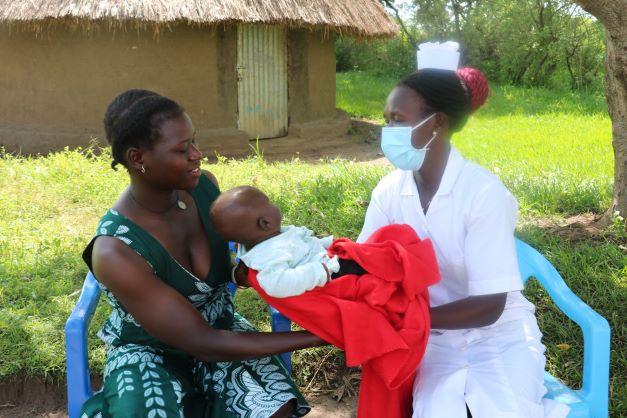In Uganda, frequent follow up and retention of mothers’ increase antenatal care visits
The success of foetal life
determines not only the health of the new-born, but also has a major impact on
adult health. With access to antenatal and with regular monitoring, early
detection of complications and treatment, these risks can be prevented. Thus, attending
antenatal care (ANC) is mandatory for all pregnant mothers mainly the 1st
ANC in the first trimester, the 4th ANC but also completing all the
mandatory 8 antenatal visits.
The health sector performance
report 2020 indicated that antenatal care (ANC) coverage for the fourth visit
stagnated at 42% short of the HSDP target of 47.5% in 2020. For that reason, health
facilities have become more innovative in attracting mothers to come for these
ANC visits thereby seeing a sharp increase. Case in point is during the month
of September, Alero HC III in Nwoya District registered a total of 488 mothers
visiting the facility for ANC as per the maternity register.
Mercy 27, mother of 4 children is 8 months pregnant with her 5th
child. She says, she went for her antenatal after missing her periods for 2
months after her body became weak. “I
started going for ANC at 2 months, I went with my husband, they tested our
blood and because my husband is already on ART, my test also turned out
positive. I was advised to be enrolled on ART, keep appointment dates and to
take my drugs on time. I was also advised to eat healthy and not to share sharp
objects with children. I have already attended my 4th visit where I
was told about birth preparation”.
For Monica 19 and 7 months with
her first child. It is the husband who told her to go for the ANC after he
attended one of the community outreaches and the VHT told them that once a
mother misses her periods, she should go for a test at the health facility. “They
tested our blood, checked the foetal heart beat and I was also given some drugs”.
Since then, Monica has been going to Kochi Li for ANC monthly and during the 4th
visit, the midwife emphasised that she should not miss her scheduled
appointment dates. During her last visit in September, she was told to prepare
for delivery and advised to deliver at the health facility.
Health facilities have become deliberate in attracting
pregnant mothers to attend ANC visits through organising targeted community
outreaches, community dialogues for far way and hard to reach areas. During
these outreaches, community leaders attract mothers to come for services
including immunisation, family planning, growth monitoring, screening for HIV,
malaria.
It is also during these outreaches
that facility staff tell mothers about the services offered at the facility and
encourage them to come for scheduled antenatal appointments every month. Bella, enrolled midwife at Lalogi HC IV emphasises
that “during integrated outreaches and
community dialogues we emphasise mothers to come for the 1st ANC in
the first trimester and when they come we encourage them to come 8 times. She says, these days, health
facilities provide holistic services and ANC is done daily Monday to Friday
unlike in the past when they had specific days for antenatal.
With additional RBF funding, some facilities have also
acquired a telephone set for tracking mothers for ANC visits. The midwife calls
mothers reminding them when they are due for ANC and when they come they are
told about the different packages offered at ANC. According to Milton Steven, RBF Focal Person Amuru
District, “we decided to buy a telephone line at the facility which we use to
call/remind mothers about their scheduled ANC. We also use the same line to call
mothers after delivery when they are back to their homes to find out how they
and the babies are doing”.
Additionally, the availability of
midwives at all times (day and night) has given mothers assurance that whenever
they come, there is someone to attend to them. After the RBF training we
attended, we came back and decided to be available for mothers. Today you come
any time day/night we will be available to help, Holga, enrolled midwife. Likewise, administration changed the way
they treat midwives. Staffing was an issue in the past, we had one midwife
doing maternity and ANC, but with RBF funding, we attracted a volunteer nurse
who is hired to concentrate only on ANC Dr.
Agnes, RBF Focal Person Omoro District
To some facilities increase in
ANC is as a result of referrals. They coordinate with lower facilities, in case
they have a foetal heart beat that they don’t understand, they are encouraged
to refer that mother for ultra-scan services. Lucy – enrolled comprehensive nurse at Lalogi HC IV says, “we get referrals
from lower facilities of Awoo II, Acet III, Odek III, Layoajong III for scan
services.
To Koch Li, the sharp increase of
mothers coming for ANC is attributed to the facility’s upgrade to HC III, the
construction of the maternity and the increase in staff had a remarkable effect
as confirmed by Charles, In Charge Kochi
Li. “after the upgrade to HC III
and the construction of the maternity, mothers started coming in big numbers”.
Latest news from this project
No news

